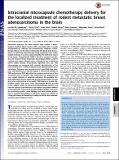Intracranial microcapsule chemotherapy delivery for the localized treatment of rodent metastatic breast adenocarcinoma in the brain
Author(s)
Upadhyay, Urvashi M.; Tyler, Betty; Patta, Yoda; Wicks, Robert; Scott, Alexander; Masi, Byron; Hwang, Lee; Grossman, Rachel; Brem, Henry; Cima, Michael J.; Langer, Robert S; Spencer, Kevin C; ... Show more Show less
DownloadUpadhyay-2014-Intracranial microca.pdf (753.2Kb)
PUBLISHER_POLICY
Publisher Policy
Article is made available in accordance with the publisher's policy and may be subject to US copyright law. Please refer to the publisher's site for terms of use.
Terms of use
Metadata
Show full item recordAbstract
Metastases represent the most common brain tumors in adults. Surgical resection alone results in 45% recurrence and is usually accompanied by radiation and chemotherapy. Adequate chemotherapy delivery to the CNS is hindered by the blood–brain barrier. Efforts at delivering chemotherapy locally to gliomas have shown modest increases in survival, likely limited by the infiltrative nature of the tumor. Temozolomide (TMZ) is first-line treatment for gliomas and recurrent brain metastases. Doxorubicin (DOX) is used in treating many types of breast cancer, although its use is limited by severe cardiac toxicity. Intracranially implanted DOX and TMZ microcapsules are compared with systemic administration of the same treatments in a rodent model of breast adenocarcinoma brain metastases. Outcomes were animal survival, quantified drug exposure, and distribution of cleaved caspase 3. Intracranial delivery of TMZ and systemic DOX administration prolong survival more than intracranial DOX or systemic TMZ. Intracranial TMZ generates the more robust induction of apoptotic pathways. We postulate that these differences may be explained by distribution profiles of each drug when administered intracranially: TMZ displays a broader distribution profile than DOX. These microcapsule devices provide a safe, reliable vehicle for intracranial chemotherapy delivery and have the capacity to be efficacious and superior to systemic delivery of chemotherapy. Future work should include strategies to improve the distribution profile. These findings also have broader implications in localized drug delivery to all tissue, because the efficacy of a drug will always be limited by its ability to diffuse into surrounding tissue past its delivery source.
Date issued
2014-11Department
Massachusetts Institute of Technology. Department of Chemical Engineering; Massachusetts Institute of Technology. Department of Materials Science and Engineering; Koch Institute for Integrative Cancer Research at MITJournal
Proceedings of the National Academy of Sciences
Publisher
National Academy of Sciences (U.S.)
Citation
Upadhyay, Urvashi M., Betty Tyler, Yoda Patta, Robert Wicks, Kevin Spencer, Alexander Scott, Byron Masi, et al. “Intracranial Microcapsule Chemotherapy Delivery for the Localized Treatment of Rodent Metastatic Breast Adenocarcinoma in the Brain.” Proceedings of the National Academy of Sciences 111, no. 45 (October 27, 2014): 16071–16076.
Version: Final published version
ISSN
0027-8424
1091-6490